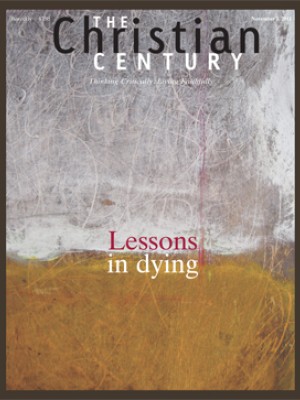Within the African canon

Martin Luther has many claims to fame. In recent years I have found him useful in an unexpected way: as a guide to understanding emerging African Christianity. Here is my unscientific rule: if Martin Luther treated a biblical book with disdain or outright hostility, then that book is really popular in modern Africa.
As a Bible scholar, Luther was a perceptive and quite daring critic. He tested the authority of books by their claims to apostolic authority and judged their faithfulness against what he considered the core teachings of the earliest church. By this standard, he argued that four New Testament books in particular—Revelation, Hebrews, James and Jude—fell short of true canonical status and should be printed separately in future versions of the Bible.
Read our latest issue or browse back issues.
In different ways, each of these books enjoys enormous popularity in Africa. Each speaks to the harsh conditions in which believers must live: conditions of poverty, social fragility and political oppression; a world in which vestiges of older religions still flourish; a world of complex religious coexistence.
Far from being repelled by the fantastic elements in Revelation, modern African scholars find the book startlingly familiar, with images such as that of the lamb, the throne and the blood of the innocent crying out for justice in time of persecution. James is appealing because of its use of traditional Wisdom themes and its profound sense of the fragility of life. Across Africa and Asia, poor believers resonate easily with the teaching that life is a vapor, a mist that rises and fades away. Even the seemingly slight book of Jude offers a stirring call to action among second-generation believers who are tempted to compromise with the surrounding culture and its pagan religions—a situation as threatening in Africa in 2011 as it was in the Mediterranean world around 100 AD.
The epistle to the Hebrews is a rich exercise in theology that actually has deep roots in African soil. Written no later than the third century, Hebrews was cherished in the Roman churches of Carthage and North Africa, where believers credited it to Paul's associate Barnabas. Some modern African thinkers find special treasures in Hebrews to the point that the brilliant Ghanaian theologian Kwame Bediako (who died in 2008) praised it as "OUR Epistle"—that is, Africa's.
Bediako's intellectual credentials gave special weight to an evaluation that might puzzle Westerners. Although he drew on both English and French cultural sources, he wanted above all to formulate a distinctively African theology. Just as such ancient pioneers as Justin Martyr and Clement of Alexandria rooted the faith in the Hellenistic and Roman cultures of their day, so Bediako strove to establish a firmly African context for the surging African Christianity of the late 20th century.
For Bediako, Hebrews was significant because of its elaborate discussion of blood sacrifice and its relationship to the Christian proclamation. Hebrews assumes deep knowledge of the Jewish
temple ritual, and its author knows a great deal about the practical minutiae of sacrificial rituals: he knows, for example, that sacrificial blood is not just shed, it is sprinkled. His core message, though, is that these sacrifices have been superseded by the once-and-for-all sacrifice of Christ. Christ, the ultimate high priest, is the culmination and conclusion of all sacrifices.
As the temple cult ceased after the Romans conquered Jerusalem in 70 AD, those arguments became less significant to later believers, and modern audiences often find concepts of sacrifice and atonement irrelevant or even shocking. At best, they are of archaeological interest.
That dismissive Western attitude contrasts sharply with the perspective in Africa, where the idea of blood sacrifice is deeply entrenched and is the backdrop to any Christian theological debates over atonement and justification. Bediako wrote in a society with a "deep tradition of sacrifice, priestly mediation and ancestral function." In Ghana, the turning points of the year were marked by the purification ritual of the Odwira, with its attendant sacrifices.
Now, though, Christians have proclaimed that these rites are obsolete. As Bediako wrote, they "have in fact been fulfilled and transcended by the one, perfect Odwira that Jesus Christ has performed once for all. . . . The Odwira to end all Odwiras has taken place through the death of Jesus Christ."
Hebrews thus becomes a decisive weapon for African Christians who are appalled by the idea that importing blood sacrifice into the churches would represent a valuable form of inculturation. The book is a manifesto warning against the slightest concession to syncretism. Amazing as it might seem to Europeans in Luther's time or afterward, Hebrews still speaks today.







